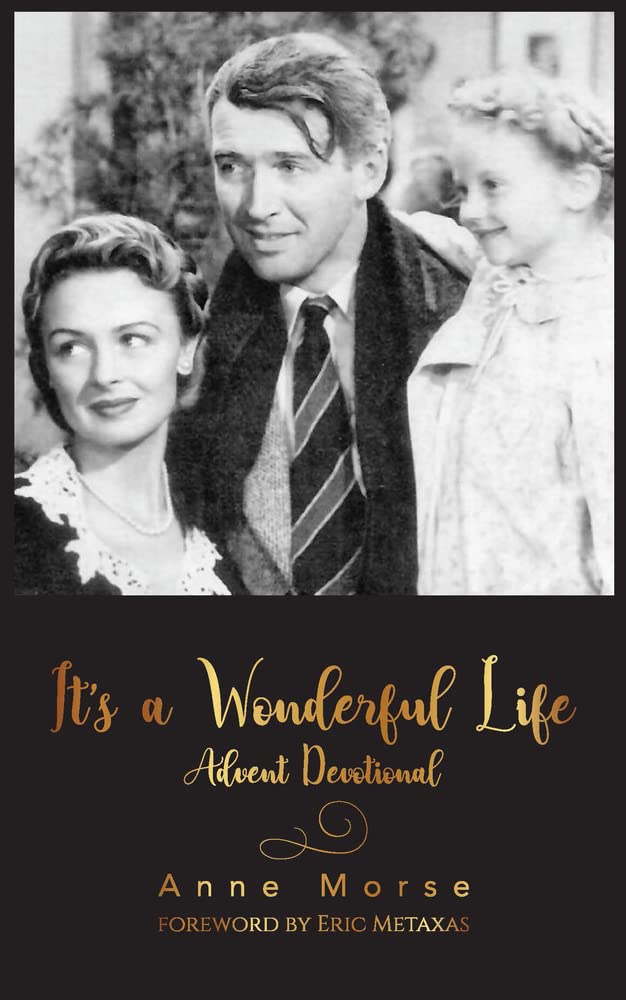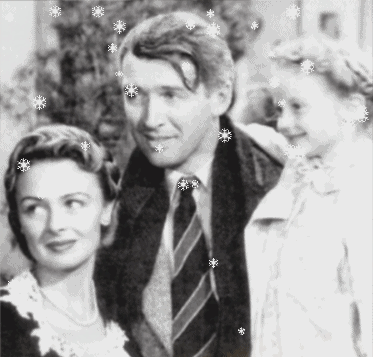
Here are some questions that people have asked me about the It’s a Wonderful Life Advent Devotional.

This advent devotional, based on the classic film, It’s a Wonderful Life, will help you discern the answer. Day by day, readers will discover, not only what a well-lived life looks like, but also how they can help their own communities become less like Pottersville and more like Bedford Falls.
For instance, are we willing to put our neighbors’ welfare ahead of piling up a fortune? Are we prepared to look after family members who cause difficulties, as Uncle Billy does? How do we respond when envy creeps into our hearts? And who do we turn to when seemingly unsurmountable problems threaten to overwhelm us?
It’s a Wonderful Life Advent Devotional explores the biblical teachings director Frank Capra smuggled into this, his greatest film, and challenges us to cultivate the virtues of courage, forgiveness, gratitude, and self-sacrifice. Above all, if we hope to create our own wonderful lives, we must learn how to love our neighbors as ourselves.
A: While I was watching It’s a Wonderful Life on TV a few Christmases ago, it occurred to me that there were quite a few biblical themes running through the film. I grabbed a pen and notebook, and began scribbling them down. Many of these themes are variations on “Do unto others as you would have others do unto you,” and “Love your neighbor.” Others have to do with being willing to sacrifice for others. I ask readers to ponder some important questions, such as: “If you had a chance to see what the world would be like had you never been born, would you conclude you had lived a wonderful life?” I want to help readers understand what a well-lived life looks like, and urge readers to ask themselves: “What can I do to make my own town less like Pottersville and more like Bedford Falls?”
For instance, are we willing to put our neighbors’ welfare ahead of piling up a fortune? Are we prepared to look after family members who cause difficulties, as Uncle Billy does? How do we respond when envy creeps into our hearts, as happens with George Bailey when Sam Wainright shows up in his fancy car and fur-draped wife? And who do we turn to when seemingly unsurmountable problems threaten to overwhelm us? George Bailey was a smart man, but he was nuts to think Mr. Potter would loan him the $8,000 he needed to replace the Building and Loan money which Uncle Billy had lost.
A: I love the end of the film, when George Bailey is running through Bedford Falls, yelling “Merry Christmas!” to everyone he meets. Everybody else seems to love this scene, too. When I attended the annual “It’s a Wonderful Life Festival” in Seneca Falls, New York a few years ago, I was amused to see people occasionally run down the snowy sidewalks, shouting Jimmy Stewart’s lines in that scene. “Merry Christmas, Emporium! Merry Christmas, you wonderful old Building and Loan!” It’s hilarious.
Another favorite scene is the one that teaches us how we should treat the poor–including the many immigrants who have come to live in Bedford Falls. Director Frank Capra was himself an immigrant from Sicily whose family who endured great poverty. Henry Potter sneeringly dismisses the immigrant Martini family as “garlic eaters.” By contrast, George trusts his good friend enough to arrange for the Building and Loan to loan Mr. Martini money to purchase a house for his family, and even helps transport the Martini family, including their goat, to their new home. This is why Mr. Martini yells angrily at the man who slugs George for being rude to his school teacher wife earlier in the film. “You hit my best friend!” he shouts. When we treat others with respect and kindness, they never forget it.
A: The fact that this devotional is based on a movie that millions of Americans, and people around the world, are familiar with—and love. Parents can watch the film on the first day of Advent with their kids, and then read a devotion each day until Christmas, learning how to apply various teachings to their own lives.
A: His very awfulness is a warning of how not to live our lives. The Bible has a lot to say about people like Henry Potter, who is willing to throw families out of his shacks if they can’t pay their rent. God is not indifferent to evil. “He is angry with the wicked every day.” (Psalm 7:11). Those who follow Him should share in that anger, and do their best to fight it, learning to “do good; seek justice, correct oppression; bring justice to the fatherless,” and “plead the widow’s cause.” Potter may be the richest man in town, but he is not a happy man. He has no family, no friends, and can point to no worthwhile accomplishments. He is working on Christmas Eve, and will probably spend Christmas Day alone.

A: The two big messages I want to get across is first, that God loves them, and wants us to love one another, and second, that the sorts of problems we see plaguing the fictional Bedford Falls—poverty, prejudice, people making decisions that hurt others, neighbors who are grieving, like Mr. Gower, the druggist, whose son succumbs to the Spanish flu, foolish relatives who cause difficulties, as Uncle Billy does—are problems we see today, in our own lives.
Two years ago, my husband’s nephew died by suicide, causing great grief to his widowed mother. My late brother was an alcoholic who caused distress and problems for the family. A man from my church is now serving a lengthy prison sentence for possessing child pornography. And we are all too aware of businesses which put profits before the welfare of their communities.
At the end of “Wonderful Life,” we are so happy to see George Bailey get out of Pottersville and back to Bedford Falls that we tend to forget that, while Pottersville is an awful place, Bedford Falls also has many problems. Like every other town in the world, Bedford Falls is affected by the Fall. We must use our time, talents, and money to battle these social ills, asking for God’s wisdom as we do.
That scene reminded me of how Jesus treated the woman caught in adultery, who was about to be stoned by her neighbors. Her neighbors were eager to judge her; Jesus reminded them that she was hardly the first person to sin. The devotion about Violet invites readers to ask themselves how they would treat someone like Violet. If we saw a modern teenage Violet Bick walking down the street, would we ignore her, or would we stop, say hello, and invite her to attend the Christmas party our church’s youth group is holding?
A: Most Americans are familiar with “It’s a Wonderful Life,” which is not surprising, given that it was shown on TV over and over again every Christmas for years. People who are curious to about Christianity, and perhaps desire to learn more about it, might be put off at some of the heavy tomes they see in their local bookstore about faith. Others may have had bad experiences with believers. But George Bailey—well, he’s a good guy. If he has something to teach seekers about faith, people might be willing to listen. That’s why I put his picture on the front cover. People don’t think “psycho nutcase Christian” when they see it. At least, I hope they don’t.
A: People tell me they really like the book. Of course, most of them are friends and family members; What else could they say? I look forward to reading reviews on Amazon after the devotional is published on October 4.
I did get a big negative from someone who objected to the idea that Frank Capra intended “It’s a Wonderful Life” to reflect Christian teachings—even though Capra himself says in his autobiography that this is exactly what he intended. This correspondent reminded me of a story I read about a grade school librarian who proudly told a friend that she made certain no “Christian” books ended up in the library, where children could be exposed to them. Ironically, she loved C.S. Lewis’s The Chronicles of Narnia, which are, of course, Christian allegory, and recommended that children read them. When the librarian’s friend explained what the Narnia books were really about, she was furious. The books were ruined for her. My point is, people see what they want to see in books and films. They don’t like Christianity—or, at least, they don’t want to like it, but unknowingly love its teachings about love and sacrifice, good and evil, forgiveness and joy.
A: Fictionally speaking, this was God’s plan for George’s life: To stay in Bedford Falls to protect his neighbors from Henry Potter, to build decent homes for low-income citizens, and, incidentally, to enjoy the blessings of family and friends. Attending college, fighting heroically in a war, and going into research and development at a glass factory was God’s will for Harry. Traveling the world and building things were God’s plan for George’s friend Sam Wainwright (“Hee Haw!”)
The stories of these three men are a reminder that we need to ask God what He wants us to do with our lives before we start making plans.
A: I try to read a passage of scripture in the morning before I get up, and study the accompanying commentary by Charles Swindoll. I most often pray late in the evening, when the house is quiet and I’m not distracted by thoughts of all the things I need to get done that day. I like to memorize classic hymns, and practice singing them when I’m driving around, running errands. Sometimes I pray for random people walking down the street, an idea I picked up from a minister long ago. As George Bailey did, I made plans for my life without reference to God, except to ask Him to bless my plans and thank him for giving me certain gifts, such as writing ability. It was a long time before I stopped pleading with God to support MY goals for my life and began asking Him what HIS were.
A: It would be an excellent Christmas gift!
The stories of these three men are a reminder that we need to ask God what He wants us to do with our lives before we start making plans.


I am thrilled my friend Anne Morse has written this wonderful advent devotional. Via the story and characters of one of the greatest films ever made, we will find biblical answers to many of our eternal questions.
A fun, refreshing, biblically-informed exploration of one of our best-loved cinematic Christmas traditions.
If you are looking for a fresh and encouraging way to incorporate a holiday tradition with the Christmas story, It’s a Wonderful Life Advent Devotional does that beautifully! Anne pulls biblical lessons out like glittering gifts ready to give joy to the reader.
After reading this devotional, you will never see Capra’s classic the same way again.
This advent guide is a true gift. A must addition to your celebration of the holidays!